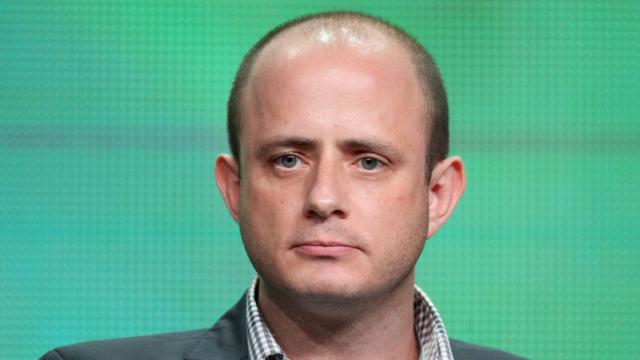Watching The Boys, one could easily come away from the show with the impression that series creator Eric Kripke has a bone to pick with the superhero adaptations that have fundamentally altered the shape of modern day Hollywood. In reality, though, Kripke’s beef is less about stories about caped heroes, and more about the messages those stories tend to convey to audiences.
In The Boys’ second season, the series takes more than a couple of brutal jabs at the likes of Marvel and DC with a subplot about the production of a big budget movie starring the members of the Seven, The Boys’ dark take on both the Avengers and the Justice League. The Boys contrasts the in-universe movie’s production with the abject monstrousness of its stars in order to reinforce the show’s overarching idea that fanatically worshipping superheroes and megacorporations is a societal harm. That’s something Kripke wants more people to understand.
[referenced id=”1518753″ url=”https://gizmodo.com.au/2020/10/the-boys-karen-fukuhara-on-beating-the-shit-out-of-nazis-and-hopes-for-season-3/” thumb=”https://gizmodo.com.au/wp-content/uploads/2020/10/13/obhxx6cjo4wiyejmwt72-e1602536718362-300×175.jpg” title=”The Boys’ Karen Fukuhara on Beating the Shit Out of Nazis and Hopes for Season 3″ excerpt=”The Boys’s second season ended with a bang — or should we say a barrage of fists. Now, actor Karen Fukuhara is looking back on her time beating up a fictional Nazi and how giving Kimiko a voice in season two addressed a problem she said she hadn’t noticed before.”]
In a recent interview with the Hollywood Reporter, Kripke admitted that, while he found Avengers: Endgame’s ode to corporatised female empowerment to be in poor taste (it was), he actually enjoys Marvel’s filmmaking a great deal. The problem, Kripke explained, is that audiences are inundated with cape films, and the underlying message baked into the vast majority of them is somewhat unhealthy.
“I sort of believe it’s dangerous, not to overstate it or be overdramatic, but it’s a little dangerous to train an entire generation to wait for someone strong to come in and save you,” Kripke reasoned. “That’s I think how you end up with people like Trump and populists who say, ‘I’m the only one who can come in, it’s going to be me.’ And I think in the way that pop-culture conditions people subtly, I think it’s conditioning them the wrong way — because there’s just too much of it.”
The Boys delves into this reading on society with the introduction of Stormfront, the newest member of the Seven, whose most devastating power is her ability to appeal to the public and drum up xenophobia in order to make the case for the need for more superheroes. From Kripke’s perspective, most traditional superheroes represent the sort of worldview that leads to the desire for strongman-type figures to exist in positions of authority, which is part of why The Boys’ big bad this season ends up being a MAGA-like Nazi. Stereotypical as Nazi villains like Stormfront tend to read on paper, Kripke’s been no stranger to those who feel as if explicitly identifying white supremacy as evil is somehow in poor taste.
“It’s frankly stunning to me that it’s a ‘controversial’ choice to make Nazis your villain,” Kripke said. “I’d have accepted the opposite. I’d have accepted, like, ‘Hey man — are you really sure you wanna go with such a cliché?’ I’d say, ‘Fair point, let’s talk about that.’ For some reason, now it’s an ‘edgy’ choice.”
As the season progresses and Stormfront’s Nazism is exposed to the public, there are times where The Boys feels as if its writers’ room was clued into what an absolute dumpster fire of a year 2020 was going to end up being. But Kripke was careful to point out that white supremacy and racism aren’t at all new concepts, and to think of them as societal ills that are only just now becoming a problem is, quite frankly, stupid.
“This is the same shit now that was happening when we wrote it in 2018,” Kripke said. “People forget that two years ago we were still dealing with cops pulling over African-American men, an incredibly amount of xenophobia and ‘there’s good people on both sides’ of white nationalism. Maybe the Proud Boys weren’t a household word, but Charlottesville was.”
“We write a lot about what frankly frustrates us. We’re living in the world’s dumbest dystopia — and we happen to have lucked into a show that is the perfect metaphor for this exact moment,” he continued, “We sort of feel both an obligation and sort of a gleeful mischievousness to chase that down as far as we can and really talk about the things in the world that are really bothering us.”
Going forward, Kripke intends to keep pulling from reality in order to tell more wild stories in The Boys’ twisted reality, like the new spinoff series focused on a group of younger heroes-in-training working through what he likened to a pro-sports combine. “It’s a Vought-owned college where young kids with powers are trained as to how to be proper superheroes, all leading to an NBA-style draft at the end of the year,” Kripke said. “It’s sort of like a college sports show meets Fame, because they also have to go to acting classes and marketing classes.”
Seasons one and two of The Boys are currently available on Amazon Prime.
